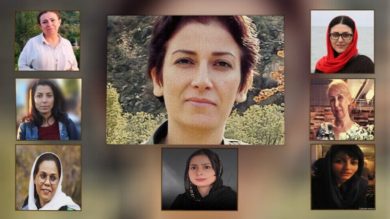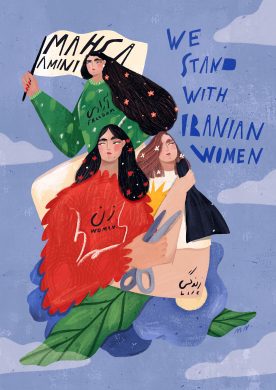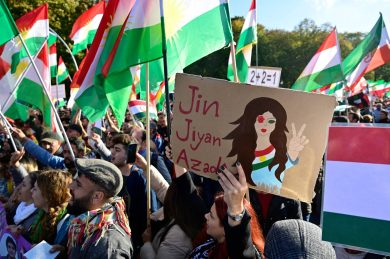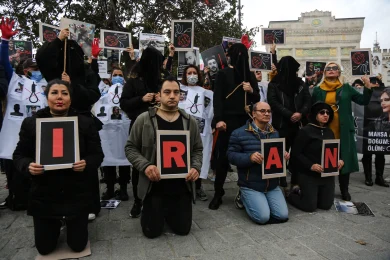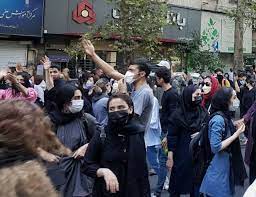Iranian exiles thought that crossing a border would bring safety. That in cities like London, Berlin, Toronto, or Los Angeles, they could finally speak freely — write, organize, protest. But for many, the long arm of the Islamic Revolutionary Guard Corps (IRGC) has followed them.
Operating through embassies, cultural centers, cyber units, and proxy networks, the IRGC has built a transnational repression machine. Its mission: to silence dissent, monitor critics, and make sure no one — even abroad — escapes the Islamic Republic’s reach.
This article explores how the IRGC surveils, harasses, and threatens members of the Iranian diaspora around the world. Through real stories, legal cases, and intelligence leaks, it maps a chilling truth: exile does not guarantee freedom.
1. A Global Strategy of Intimidation
Transnational repression — the targeting of dissidents and activists beyond a country’s borders — has become a cornerstone of the IRGC’s foreign operations. It reflects the regime’s fear of the diaspora’s power: its free media, its political lobbying, and its growing role in organizing international pressure.
IRGC Goals Abroad:
• Monitor and infiltrate diaspora communities
• Intimidate activists and journalists
• Discredit opposition figures
• Influence or co-opt foreign policy through lobbying and propaganda
• Carry out abductions or assassination plots
These operations are typically managed by the IRGC’s Intelligence Organization in coordination with Iran’s Ministry of Intelligence and Security (MOIS) and the Quds Force.
2. Digital Surveillance: Watching from Afar
Much of the IRGC’s monitoring is done online — and at scale.
Tactics Include:
• Tracking social media posts and protest footage
• Collecting biometric and geolocation data
• Deploying spyware and phishing campaigns
• Hacking emails and cloud accounts
• Using fake identities to infiltrate diaspora networks
Cyber units within the IRGC target Iranian dissidents, journalists, and NGOs. One prominent case involved the hacking of Iran International, a Persian-language news network based in London.
Several exiled journalists had their devices infected, their personal contacts leaked, and their families in Iran threatened.
3. Embassies and Cultural Centers as Surveillance Hubs
Iranian embassies and affiliated institutions abroad often double as intelligence outposts.
Reported Activities:
• Gathering lists of political dissidents
• Photographing or videotaping protests and attendees
• Recruiting informants inside diaspora groups
• Pressuring dual nationals to “return” to Iran for questioning
In Canada, the Iranian Cultural Centre in Toronto was flagged by community members for photographing protests and collecting personal details. In Germany, the Islamic Centre Hamburg was exposed for links to IRGC proxies and Hezbollah networks.
4. Threats to Families Inside Iran
One of the most common tools of IRGC transnational repression is family coercion.
Pattern:
• A journalist or activist speaks out abroad.
• Their relatives in Iran are summoned by intelligence agencies.
• They’re threatened with job loss, arrest, or worse unless the activist “stays quiet.”
Activists like Masih Alinejad, Saba Farzan, and Shirin Ebadi have spoken publicly about this pattern. In some cases, relatives are arrested or interrogated repeatedly. In others, they are forced to appear on state TV condemning their loved ones abroad.
This tactic turns family bonds into leverage, creating emotional and moral blackmail.
5. Kidnapping and Assassination Plots
In recent years, the IRGC has escalated its tactics — moving from threats to action.
Major Incidents:
• 2021: U.S. authorities thwarted a plot to kidnap journalist Masih Alinejad from New York and smuggle her to Venezuela.
• 2018: An Iranian diplomat stationed in Vienna orchestrated a bomb plot targeting a rally in Paris organized by the exiled opposition group NCRI. He was later convicted in Belgium.
• 2022: Multiple IRGC-linked assassination plots were uncovered in Turkey and Cyprus targeting Iranian dissidents.
• 2023: A failed assassination attempt against a senior member of Iran International in London led to a major diplomatic fallout.
These plots demonstrate the IRGC’s willingness to cross international lines and risk diplomatic consequences.
6. Disinformation and Smear Campaigns
When violence or threats fail, the IRGC turns to character assassination.
How It Works:
• State media outlets like Tasnim News, Fars News, and Press TV publish false stories about activists abroad.
• Accusations include “espionage,” “corruption,” “anti-Islamic behavior,” or “Zionist collaboration.”
• Social media bots amplify these stories to discredit dissidents in both Iran and diaspora communities.
This tactic isolates activists, damages their credibility, and feeds paranoia within opposition circles.
7. Front Organizations and Proxy Networks
The IRGC doesn’t always act directly. It often works through:
• Religious and cultural foundations
• Student associations
• Trade and commerce networks
• Media influencers posing as independent commentators
These proxies may gather intelligence, spread propaganda, or even coordinate harassment campaigns. In some cases, they lobby host governments to pressure or discredit Iranian human rights groups.
Example: The Al-Mustafa International University, with branches in dozens of countries, has been linked to ideological training and IRGC soft-power recruitment.
8. Targeting Diaspora Women
Women are especially targeted by the IRGC’s tactics abroad.
Methods:
• Publishing intimate photos or fake “confessions”
• Threatening rape or honor-based violence against family members
• Targeting feminist voices under accusations of “moral corruption” or “espionage”
Many high-profile women journalists and influencers report experiencing gendered threats and sexualized harassment in both online and real-world contexts.
This reinforces the IRGC’s internal policy of using misogyny as statecraft.
9. Western Inaction and Loopholes
Despite evidence, many Western democracies have not taken decisive action.
Gaps in Protection:
• IRGC is not designated as a terrorist organization in the EU, UK, or Canada
• Exiled Iranians are often denied protective status or asylum
• Legal frameworks for countering transnational repression are underdeveloped
• Surveillance and harassment are difficult to prosecute without direct evidence
This lack of accountability emboldens the IRGC, which sees that fear works — and that the consequences are minimal.
10. Psychological Toll: Exile Without Safety
For many in the diaspora, the fear never ends.
Psychological Impact Includes:
• Constant self-censorship
• Depression and anxiety
• Fear of endangering family
• Avoidance of protests, media, or political engagement
Some change names, move cities, or disappear from activism entirely. Others persist — but under immense emotional strain.
Exile, once seen as a path to safety, has become a battlefield of shadows.
11. Resistance in Exile: Fighting Back
Despite threats, Iranian exiles continue to organize, expose, and resist.
Forms of Defiance:
• Journalism and whistleblowing
• Legal action in European courts under universal jurisdiction
• Public testimony about IRGC intimidation
• Advocacy for terrorist designation and policy reform
Campaigns like #IRGCActNow and #JusticeForIran continue to push for accountability and protection of exiled voices.
Survivors and activists increasingly see legal frameworks as the next frontier of resistance.
12. Recommendations for Protection and Accountability
Host Governments Should:
• Fully designate the IRGC as a terrorist entity
• Expel IRGC-linked diplomats and intelligence operatives
• Sanction individuals and institutions engaged in transnational repression
• Offer fast-track asylum and protection for at-risk dissidents
• Fund secure platforms and cybersecurity training for exiled Iranians
Civil Society Can:
• Document and archive threats and abuse
• Support victims with legal and mental health resources
• Build coalitions across diaspora communities
• Pressure governments to act decisively
Conclusion: No Border Is Safe Until Justice Is Global
The IRGC’s goal is clear: to make exile feel like imprisonment. To turn every city into Tehran. To make fear a passport that never expires.
But the diaspora is not backing down. From Toronto to Berlin, Istanbul to Sydney, Iranian voices are rising — stronger, braver, louder.
Join Our Newsletter!
Stay informed with the latest updates, news, and ways to take action in the fight for justice and global security. Sign up now to get updates delivered straight to your inbox!

